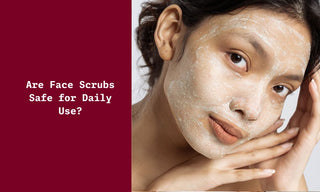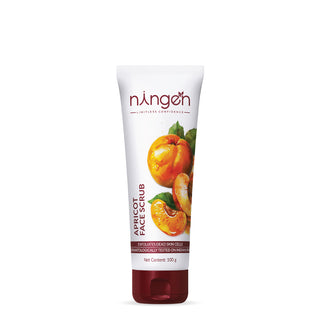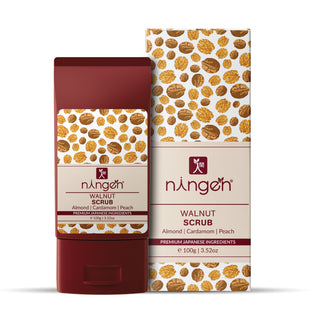Regarding skincare, face scrubs are popular for their ability to exfoliate and reveal smoother, brighter skin. But are face scrubs safe for daily use? Or they are safe to use? While exfoliation is essential for removing dead skin cells and promoting a healthy glow, overdoing it might lead to irritation, dryness, or even skin damage. In this blog, we’ll explore whether face scrubs are suitable for daily use and how to incorporate them into your routine for the best results.
In This Article;
- What are Face Scrubs?
- Benefits of Face Scrubs
- Are Face Scrubs Safe for Daily Use?
- How Often Should You Exfoliate?
- Signs of Over-Exfoliation
- Common Exfoliant Ingredients in Face Scrubs
- The Bottom Line
- TL;DR
- Frequently Asked Questions
What are Face Scrubs?
Face scrubs are skincare products designed for exfoliation, which is the process of removing dead skin cells from the skin's surface. They often contain small particles, beads, or chemicals that help to slough away the dead cells when rubbed onto the skin in circular motions, leaving it feeling smoother and brighter. By clearing away these dead cells, face scrubs can help prevent clogged pores, reduce dullness, and improve the overall texture of your skin.
When used correctly, face scrubs can lead to smoother skin, help to prevent clogged pores, and make the skin appear more radiant. They can be used on various skin types, including oily, dry, combination, acne-prone, and sensitive skin. However, the frequency and type of face scrub suitable for daily usage largely depend on the individual's skin type and tolerance.
Types of Exfoliants:
When it comes to exfoliating your skin, there are different types of exfoliants you can choose from, each catering to specific skin needs. Here's a breakdown of the main types:
1. Physical Exfoliants
- Description: These exfoliants contain small, gritty particles that manually slough off dead skin cells when massaged onto the skin.
- Common Ingredients: Crushed nuts, seeds, sugar, or microbeads.
- Best For: Normal to oily skin types, those looking for an immediate smoothness boost.
- Caution: Can be too abrasive for sensitive or acne-prone skin if not used gently.
2. Chemical Exfoliants
- Description: These exfoliants use acids or enzymes to dissolve the bonds holding dead skin cells together, allowing them to be easily washed away.
- Types:
- AHAs (Alpha Hydroxy Acids): Water-soluble acids like glycolic and lactic acid that gently exfoliate the skin’s surface, making them great for dry or sun-damaged skin.
- BHAs (Beta Hydroxy Acids): Oil-soluble acids like salicylic acid that penetrate deeper into the pores, making them ideal for oily or acne-prone skin.
- Best For: A wide range of skin types, especially those dealing with acne, hyperpigmentation, or uneven skin tone.
3. Enzyme Exfoliants
- Description: Derived from fruits like papaya or pineapple, enzyme exfoliants gently break down dead skin cells without the need for scrubbing or chemical acids.
- Best For: Sensitive skin types that may react to physical or chemical exfoliants.
- Caution: Less intense than other types, so they may need to be used more frequently for noticeable results.
4. Mechanical Exfoliants
- Description: This category includes exfoliation tools like brushes, sponges, or microdermabrasion devices that physically remove dead skin cells.
- Best For: Those looking for a more intensive exfoliation experience.
- Caution: Should be used with care to avoid over-exfoliation, which can lead to irritation or damage.
Table: Exfoliating Benefits by Skin Type
|
Skin Type |
Benefit |
|
Oily Skin |
Reduces shine and helps balance oil production |
|
Dry Skin |
Alleviates flakiness and rough patches |
|
Combination Skin |
Targets oily zones while soothing dry areas |
|
Sensitive Skin |
Can help reduce redness if a gentle scrub is used |
|
Acne-Prone Skin |
Helps prevent breakouts by keeping pores clear |

Benefits of Face Scrubs
Here are the benefits of using face scrubs:
1. Exfoliates Dead Skin Cells: Face scrubs remove dead skin cells from the surface, revealing fresher, brighter skin underneath.
When dead skin cells are removed, your skin becomes smoother and more radiant. This process helps to reveal fresher, younger-looking skin underneath, improves skin texture and enhances the absorption of skincare products. It also reduces the likelihood of clogged pores, preventing acne and promoting a healthy, glowing complexion.
2. Unclogs Pores: Regular exfoliation helps to clear out pores, reducing the chances of blackheads, whiteheads, and acne.
When your pores are unclogged, your skin can breathe better, reducing the chances of acne and breakouts. It also improves the absorption of skincare products, leading to a smoother, clearer complexion with fewer blackheads and less noticeable pores.
3. Improves Skin Texture: By smoothing out rough patches and uneven skin, face scrubs can leave your skin feeling softer and more refined. Exfoliation improves skin texture by removing dead skin cells that can make your skin appear rough, dull, and uneven.
By clearing away these cells, exfoliation reveals the smoother, softer skin underneath, leading to a more even complexion. Regular exfoliation also stimulates cell turnover, which helps to keep your skin looking fresh and vibrant.
4. Enhances Absorption: After exfoliating, your skin is better able to absorb skincare products like serums and moisturizers, making them more effective.
Exfoliation enhances absorption by clearing away the layer of dead skin cells that can act as a barrier on the skin's surface. When these cells are removed, skincare products like serums and moisturizers can penetrate more deeply and effectively into the skin. This allows the active ingredients in your products to work more efficiently, maximizing their benefits and improving overall skin health.
5. Promotes Radiance: Regular use of face scrubs can help brighten your complexion, giving your skin a natural, healthy glow.
Exfoliation promotes radiance by removing dead skin cells, revealing the fresher, brighter skin underneath. This process helps to smooth out the skin's surface, allowing light to reflect more evenly, which gives your complexion a healthy, radiant glow. Regular exfoliation also improves skin cell turnover, further enhancing your skin's natural brightness and vitality.
Are Face Scrubs Safe for Daily Use?
Face scrubs can be a beneficial part of your skincare routine, but their safety for daily use depends on various factors, including your skin type and the specific scrub you use.
Key Points to Consider:
- Skin Type:
- Sensitive Skin: Daily exfoliation can irritate sensitive skin, leading to redness or inflammation. Opt for a gentle scrub or exfoliate less frequently.
- Oily or Acne-Prone Skin: These skin types may benefit from more frequent exfoliation to help keep pores clear and reduce breakouts, but daily use should still be approached with caution.
- Normal to Combination Skin: Daily exfoliation might be okay for some, but it’s essential to monitor how your skin reacts.
- Exfoliant Type:
- Physical Scrubs: These contain granular particles that physically slough off dead skin. Overuse can cause micro tears or irritation.
- Chemical Exfoliants: These use acids or enzymes to dissolve dead skin cells. They may be gentler and can sometimes be used more frequently, but it's essential to follow the product's recommendations.
- Product Ingredients: Choose face scrubs with suitable ingredients for your skin type. Avoid overly abrasive scrubs or those with harsh chemicals.
- Frequency: For most people, exfoliating 2-3 times a week is effective. Daily exfoliation might be excessive and could lead to dryness or irritation.
While face scrubs can enhance your skin’s appearance and texture, if we have to conclude whether are face scrubs safe for daily use or not, might be a yes-no for different individuals. It’s crucial to tailor your exfoliation routine to your skin’s needs and to observe how your skin responds.
Below is a table summarizing the main points for safe application:
|
Skin Type |
Frequency |
Application |
Wash Off |
Follow-Up |
|
Determine Type |
2-3 Times Per Week |
Gentle Circular Motions |
Lukewarm Water |
Moisturize |
|
Sensitive Use Chemical Exfoliants |
Patch Test Before Use |
Avoid Excessive Pressure |
Observe Reaction |
Protect New Skin |
How Often Should You Exfoliate?
Exfoliation frequency can vary depending on your skin type, the type of exfoliant you use, and your individual skin needs. Here’s a general guideline on how often you should exfoliate:
1. Skin Type Considerations:
- Sensitive Skin: Exfoliate 1-2 times per week. Choose gentle exfoliants with mild ingredients to avoid irritation.
- Dry Skin: 1-2 times per week. Opt for hydrating exfoliants to help remove dead skin without stripping moisture.
- Oily or Acne-Prone Skin: 2-3 times per week. Use exfoliants that help control excess oil and keep pores clear.
- Normal to Combination Skin: 2-3 times per week. Adjust the frequency based on how your skin responds.
2. Type of Exfoliant:
- Physical Exfoliants: For scrubs with granular particles, 1-2 times per week is often sufficient to prevent over-exfoliation and irritation.
- Chemical Exfoliants: For products like AHAs (alpha hydroxy acids) or BHAs (beta hydroxy acids), 2-3 times per week is typically effective. Some chemical exfoliants are formulated for more frequent use but always follow product recommendations.
3. Skin Condition:
- Acne: If using exfoliation to help with acne, you might benefit from more frequent use, but balance is key to avoid worsening irritation.
- Aging Skin: Regular exfoliation can help with cell turnover and reduce the appearance of fine lines. 2-3 times per week is often recommended.
4. General Tips:
- Listen to Your Skin: Adjust frequency based on how your skin feels. If you notice dryness, redness, or irritation, cut back on exfoliation.
- Hydrate and Protect: After exfoliating, always follow up with a good moisturizer and sunscreen to protect and hydrate your skin.
Exfoliation should be a balanced part of your skincare routine. For most people, exfoliating 1-3 times per week is ideal, depending on skin type and the exfoliant used.
Also read: How to use Salicylic acid for your skin?
Signs of Over-Exfoliation
Over-exfoliation of the skin can cause a variety of noticeable signs indicating that the skin barrier may have been compromised. Here are some common symptoms that suggest you might be exfoliating too much:
- Redness and Irritation: Persistent redness and a feeling of irritation on the skin's surface.
- Increased Sensitivity: Skin becomes more sensitive to skincare products or environmental factors.
- Dryness and Flakiness: The skin may appear dry and flaky due to the loss of its natural oils.
- Tightness: A sensation of tightness, as if the skin is being pulled or stretched.
- Breakouts: Over-exfoliation can lead to an increase in acne or breakouts due to irritation.
- Shiny or Waxy Look: The skin might look unusually shiny or have a waxy appearance.
- Stinging or Burning: The application of products may cause a stinging or burning sensation.
- Peeling: Excessive exfoliation can lead to peeling of the outer layer of skin.

Common Exfoliant Ingredients in Face Scrubs
1. Salicylic Acid
- Benefits: A beta hydroxy acid (BHA) that penetrates deep into pores to dissolve excess oil and dead skin cells. Ideal for oily and acne-prone skin.
- How It Works: Helps clear clogged pores, reducing blackheads and acne.
2. Glycolic Acid
- Benefits: An alpha hydroxy acid (AHA) that exfoliates the surface layer of the skin, promoting cell turnover.
- How It Works: Improves texture, reduces fine lines, and brightens the complexion by removing dead skin cells.
3. Lactic Acid
- Benefits: A gentle AHA that exfoliates and hydrates, making it suitable for sensitive or dry skin.
- How It Works: Enhances skin texture and moisture levels while promoting a radiant look.
4. Papaya Enzyme
- Benefits: A natural enzyme that breaks down dead skin cells without physical scrubbing. Ideal for sensitive skin.
- How It Works: Dissolves dead skin cells, leaving the skin smoother and brighter.
5. Pineapple Enzyme
- Benefits: Contains bromelain, which helps to gently exfoliate and brighten the skin.
- How It Works: Breaks down proteins that cause dead skin build-up, promoting a fresh and clear complexion.
6. Jojoba Beads
- Benefits: Smooth, round beads that provide gentle exfoliation without harshness.
- How It Works: Sloughs off dead skin cells while being non-abrasive, suitable for sensitive skin.
7. Retinol
- Benefits: A Vitamin A derivative that speeds up cell turnover and improves skin texture.
- How It Works: Stimulates the shedding of old skin cells and promotes the growth of new, healthy cells.
8. Charcoal
- Benefits: Draws out impurities and excess oil from the skin, providing deep cleansing.
- How It Works: Absorbs toxins and unclogs pores, leading to a clearer complexion.
9. Vitamin C
- Benefits: An antioxidant that brightens the skin and helps even out skin tone.
- How It Works: Enhances radiance and fades dark spots, while offering mild exfoliating benefits.
10. Aloe Vera
- Benefits: Soothes and hydrates the skin, reducing irritation from exfoliation.
- How It Works: Moisturizes and calms the skin, making it ideal for use after exfoliating.
11. Tea Tree Oil
- Benefits: Has antibacterial properties that help treat and prevent acne.
- How It Works: Cleanses the skin and reduces inflammation, making it effective for acne-prone areas.
12. Orange Peel Extract
- Benefits: Contains natural acids and Vitamin C that brighten and refresh the skin.
- How It Works: Exfoliates and revitalizes, helping to clear dullness and uneven texture.
13. Apricot Kernels
- Benefits: Provides a natural, abrasive texture for exfoliation.
- How It Works: Helps to remove dead skin cells and smooth the skin’s surface.
14. Walnut Shell Powder
- Benefits: Offers a gritty texture that effectively sloughs off dead skin cells.
- How It Works: Provides physical exfoliation, helping to improve skin texture and remove impurities.
These ingredients are commonly used in face scrubs to achieve effective exfoliation, catering to various skin types and concerns.
Also read: How to start with Retinol?

Note: Discover our meticulously curated collection of recommended exfoliants, perfect for all skin types.
The Bottom Line
Face scrubs can enhance your skincare routine by improving texture, reducing pore congestion, and brightening your complexion. For daily use, opt for gentle scrubs, while harsher ones should be used 1-3 times a week to prevent irritation. Adjust based on your skin's needs and consult a dermatologist if needed.
TL;DR
Face scrubs help exfoliate and improve skin texture, but daily use depends on skin type and scrub type. Sensitive skin should exfoliate 1-2 times a week, oily or acne-prone skin can handle 2-3 times a week, and normal to combination skin can also use scrubs 2-3 times a week. Over-exfoliation can lead to irritation, so adjust use based on your skin’s response. Key ingredients include salicylic acid, glycolic acid, and natural exfoliants like papaya and walnut shell powder. Always choose a scrub suitable for your skin type and avoid overuse.
Frequently Asked Questions
Q1. How often should I use a face scrub?
Exfoliate 1-2 times a week for sensitive skin, 2-3 times a week for oily or acne-prone skin, and adjust based on your skin’s response.
Q2. Can face scrubs be used daily?
It depends on your skin type and the exfoliant's intensity. Daily use may be too harsh for sensitive skin but could be suitable for some types of oily skin.
Q3. What are the benefits of using a face scrub?
Face scrubs remove dead skin cells, unclog pores, improve skin texture, enhance product absorption, and promote radiance.
Q4. Are physical exfoliants safe for sensitive skin?
Physical exfoliants can be too abrasive for sensitive skin. Opt for gentler scrubs or chemical exfoliants.
Q5. What are chemical exfoliants and how do they work?
Chemical exfoliants use acids like AHAs and BHAs to dissolve dead skin cells, offering a gentler alternative to physical scrubs.
Q6. How do enzyme exfoliants differ from other types?
Enzyme exfoliants use natural fruit enzymes to break down dead skin cells without physical scrubbing or acids, ideal for sensitive skin.
Q7. What are the common ingredients in face scrubs?
Common ingredients include salicylic acid, glycolic acid, papaya and pineapple enzymes, jojoba beads, and natural exfoliants like apricot kernels and walnut shell powder.
Q8. What should I do if my skin becomes irritated from exfoliation?
Reduce the frequency of exfoliation, switch to a gentler scrub, and ensure you’re moisturizing and protecting your skin.
Q9. Can exfoliating help with acne?
Yes, exfoliation can help keep pores clear and reduce breakouts, especially with scrubs containing salicylic acid.
Q10. How should I choose the right face scrub for my skin type?
Choose a scrub based on your skin type and concerns. For sensitive skin, opt for gentle or enzyme-based exfoliants. For oily or acne-prone skin, consider products with BHAs.










